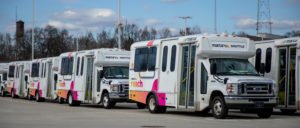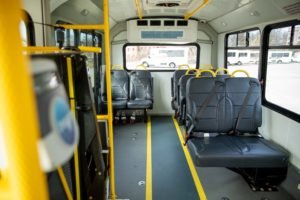
MARTA ridesharing may be coming to a community near you! This upcoming March, the Metropolitan Atlanta Rapid Transit Authority (MARTA) plans to unveil its newest initiative: MARTA Reach. In collaboration with Georgia Tech, MARTA is releasing a six-month pilot for an on-demand ride-sharing program. This initiative will be especially beneficial for older people and people with disabilities.
According to the National Aging and Disability Transport Center, access to public transit can be crucial for maintaining independence and quality of life. However, public transportation systems can present unique challenges for certain people. Long walks to bus stops, inclement weather, and even poor sidewalk conditions can all greatly impede accessibility. MARTA Reach has the potential to address some of these issues here in the metro Atlanta area. (Note MARTA’s service area includes Clayton, DeKalb, and Fulton counties.)
To learn more about this program and how it impacts accessibility in Atlanta, I reached out to Stephany Fisher, Media Relations Manager at MARTA.
Lex Echols: Tell me a little bit about MARTA and your work!

Stephany Fisher: Established in 1971, MARTA is among the largest transit agencies in the U.S., providing 95 percent of the public transit trips in the metro Atlanta region with 110 fixed bus routes, 38 heavy rail stations, 2.7 miles of light rail, and on-demand paratransit services. MARTA is primarily funded by a 1 percent sales tax in Fulton, DeKalb, and Clayton counties and a 1.5 percent sales tax in the City of Atlanta.
MARTA, in partnership with Georgia Tech, is launching MARTA Reach, a six-month pilot rideshare service designed to connect riders to-and-from MARTA bus and rail. MARTA Reach will test how on-demand shuttles can be used to make it easier and faster for customers to get to their destinations using MARTA and help minimize waiting and walking.
Customers are matched in real-time with dynamically-routed vehicles that connect to fixed-route transfer hubs. The service is being piloted in three zones within MARTA’s service area – West Atlanta, Belvedere Park, and the Gillem Logistics Center. Within each zone, frequently-spaced “virtual” stops will be defined where customers may request a pick-up or drop-off. Riders may request a trip using a smartphone app or by calling a customer reservation line. MARTA Reach costs the same as a MARTA fare – $2.50. The service runs from 6 a.m. until 7 p.m. Monday through Friday and is a ridesharing service, meaning other passengers may be picked up and dropped off during your trip.

LE: Ridesharing seems to be a hot topic in public transportation right now, can you tell me more about what led to MARTA’s decision to invest in a shuttle service?
SF: MARTA was exploring the idea of on-demand service when an opportunity presented itself to work with Georgia Tech through a grant from the National Science Foundation. The information from the pilot will be used to inform how a large-scale version would work across MARTA’s service area as we undertake a comprehensive redesign of our bus network.
LE: MARTA already has an ADA Complementary Paratransit program for people with disabilities, but it requires an application and an in-person interview to receive services. In what ways do you anticipate MARTA Reach impacting the accessibility of MARTA as a whole?
SF: MARTA Reach makes MARTA more accessible to all customers. It can serve those who do not quality for MARTA Mobility, who would prefer to use the fixed route service and cannot due to walking distance to bus stops and rail stations, or who need to make unscheduled trips. MARTA Reach does not require a reservation [whereas MARTA’s paratransit does] and is limited to specific geographic “zones” that have been identified as well-suited to the demand-response service model. All MARTA Reach shuttles will be wheelchair accessible.
LE: If the six-month pilot goes well, what are your plans for the future of MARTA Reach? What are you most excited for moving forward?
SF: MARTA looks forward to evaluating the success of the pilot based on the metrics of service effectiveness, operations and safety, access, and customer experience. We are excited to learn how our customers use this type of service, so that we have more data to make informed decisions about the future of on-demand service for MARTA.
___
For more information about transportation for older people and people with disabilities in the Metro Atlanta area, check out our Transportation Options page, or visit the Empowerline website to be connected with services & counseling.



